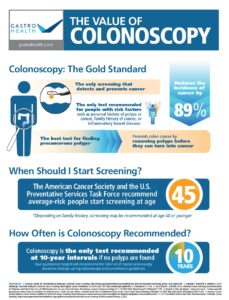Colon cancer (colorectal cancer) is the third most common type of non-skin cancer in both men (after prostate cancer and lung cancer) and women (after breast cancer and lung cancer). It’s the second leading cause of cancer death in the United States after lung cancer. The rates of new colon cancer cases and deaths for adults aged 50 years or older are decreasing in this country due to screening beginning at age 45. However, the rate of colorectal cancer in adults under age 50 has been increasing. A new study published in JAMA Oncology in 2019 found a link between early-onset colorectal cancer risk in women and obesity.
Colon cancer is a disease in which abnormal cells in the colon or rectum (part of your body’s digestive system) divide uncontrollably, eventually forming a malignant tumor.
The major risk factors for colon cancer:
- Family history
- History of inflammatory bowel disease (ulcerative colitis or Crohn disease)
- You have genetic syndrome such as familial adenomatous polyposis (FAP) or hereditary non-polyposis colorectal cancer (Lynch syndrome)
- Older age
- Excessive alcohol use
- Obesity
- Being physically inactive
- Cigarette smoking
- Diet (evidence suggests may play a role)
Several screening tests have been developed to help physicians find colorectal cancer early, when it can be more treatable. Some tests that detect adenomas and polyps can actually prevent the development of cancer because these tests allow growths that might otherwise become cancer to be detected and removed. Colon cancer screening is early detection and may be a form of cancer prevention.
When Should I Begin Screening?
The U.S. Preventive Services Task Force (USPSTF) recommends screening for colon cancer using high-sensitivity fecal occult blood testing, sigmoidoscopy, or colonoscopy beginning at age 45 and continuing until age 75.
Colon cancer almost always develops from precancerous polyps (abnormal growths) in the colon or rectum. Screening tests can discover precancerous polyps, so that they can be removed before becoming cancerous. Screening tests can also find colon cancer early, when treatment works best. Talk with your primary care provider about when you should begin screening with one of our board-certified physicians.

